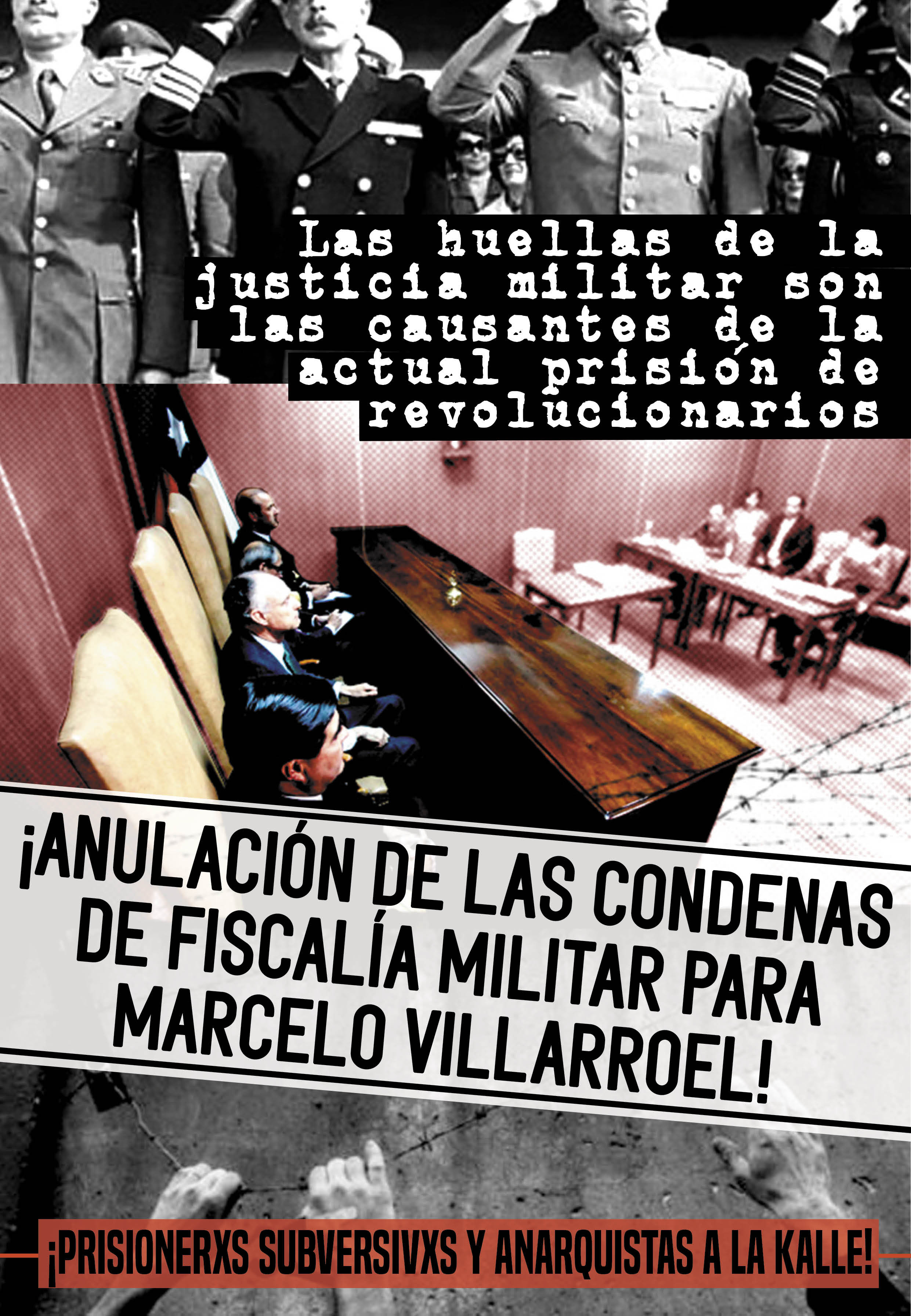Text: A Legacy of Disgrace: On the situation of comrade Marcelo Villarroel Sepúlveda
The backlog of pages and cases passed from one office to another, from one department to another and from one ministry to another. The pages were still white, they had not yet yellowed as they eventually would. To tell the truth, many things at that time passed from one office to another, the transition accommodated and rearranged things so that nothing changed.
The urban guerrilla warfare, assaults, executions, brass, gunpowder, statements of armed hooded men, stolen cars, banks and blasts of the nineties were translated into the legal language of illicit association, homicide, co-perpetrator of homicide, formation of a combat group, robbery with intimidation, serious injuries and an almost infinite etcetera.
Five crimes in different folders that were grouped using their respective judicial nomenclatures were prosecuted by court officer Arnoldo Dreyse Jolland, star of the judicial system during the last years of the dictatorship. With the end of the dictatorship and the beginning of democracy, the players are shuffled and Hernán Ramirez Rurange became more relevant. Former head of the National Intelligence Directorate of the Army and military judge in the 1990s, all these files lead to Ramirez.
There was no need for him to read them in their entirety; with a quick glance he knew who was who and what was necessary for a harsh sentence. Ramirez had been Pinochet’s personal aide-de-camp and deeply resented this transition of the “political gentlemen”, but he also knew what was happening in the streets and the need to continue with the complete extermination of subversion. The countless attacks, weapons seizures, ambushes and assaults showed that the strength of the various armed groups had not completely stopped after the plebiscite. The dictatorship was already worn out and it was necessary to adapt to the new times in order to strip those who were not even satisfied with the vote of their last breath. There was blood, a lot of blood staining the streets of democracy.
Ramirez signed everything he had to sign, increased all the fines he could increase, doubled all the crimes he could. Using a pencil he added everything up with a smile on his face: fifteen plus eight plus ten plus ten plus ten plus three… A forty-six year sentence against his defendant, that 19-year-old militant of the Mapu Lautaro.
But those years were also hectic for Ramirez, and he was conspiring in his own way. While testifying, he was accused of helping one of the murderers of union leader Tucapel Jiménez get out of the country. Ramirez and his cronies-in-arms learned that the DINA chemist Eugenio Berrios, expert manufacturer of poisonous gases, was to testify for the death of Orlando Letelier. The transition was beginning to take several emblematic cases against repressors to trial.
A few quick meetings and conversations between Ramirez and his comrades-in-arms and Berrios was taken out of the country, his body appearing on a beach in Uruguay in 1995. Silencing his own accomplices and collaborators was no problem, they weren’t the only ones killing each other like rats.
In the nineties Ramirez made his contribution to the legal system of the transition: Silencing and taking care of his comrades-in-arms on the one hand, and on the other, burying those who fought against the prevailing order under long sentences.
In 2004, he was prosecuted for the death of Berrios and remained in the military police battalion of Peñalolén for some time. A blow to his honor, but he knew he was among comrades and in a military compound. After some judicial procedures he managed to get permission to walk free while waiting out that slow case.
Already getting on in years, he was overwhelmed by the case against him when the TV started showing a bank robbery and the death of a policeman in the center of the capital.
He followed the news attentively, through each report of that large magazine that he read in his living room, until the outcome led him to a name he already knew: Marcelo Villarroel, former militant of the Mapu Lautaro and current autonomous subversive fighter, whom he had sentenced to half a century in prison, but who had been able to get out thanks to hunger strikes, internal struggles and outside support, gaining access to parole.
He followed the news with some attention, until Marcelo was arrested in Argentina, but he no longer held any relevant position. He made a couple of calls, more out of curiosity and some concern about the continuation of his work: the sentence. He was reassured to learn that Marcelo’s parole was immediately revoked. In other words, he would have to serve the full sentence of the military prosecutor’s office, in addition to the sentence handed down by the new justice system.
A smile and peace of mind knowing that his legacy would remain.
In 2013 the justice system handed down the sentence of 10 years for kidnapping and 10 years for illicit association against Hernán Ramírez Rurange, and this time he would be sentenced to Punta Peuco.
But Ramirez was not willing to lose his military honor, nor to serve a sentence for saving Chile or to acknowledge his participation in miserable murders to those he holds dear. He grabbed the gun with his wrinkled hand, pointed it at his head and pulled the trigger. He is rushed to the Military Hospital, but nothing remains of him but a corpse.
The echo of the shot could not be heard behind the thick walls of the High Security Prison or the High Security modules in the Rancagua penitentiary complex where Marcelo is serving out the sentences that were handed down between uniforms and pacts.

via: publicacionrefractario
Translated by Act for freedom now!
